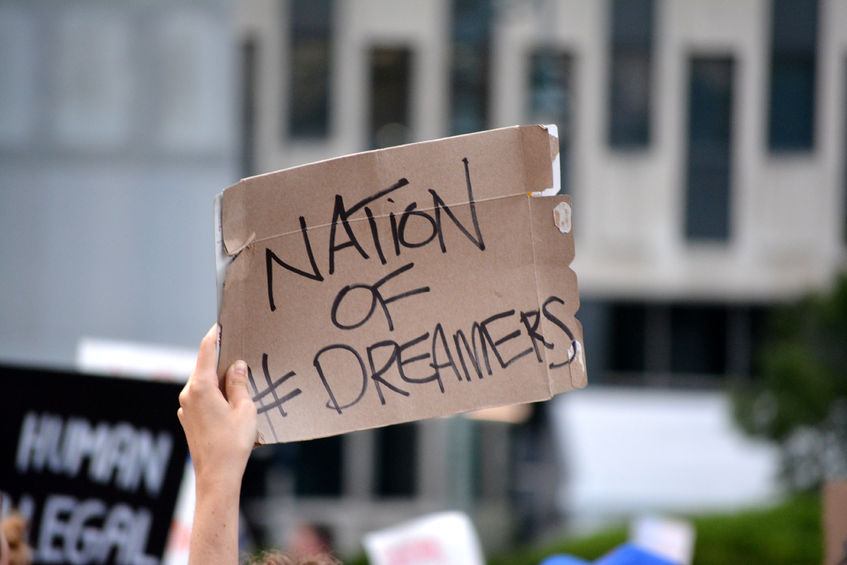Commentary: The DACA Deadline — A Matter of Safety, or Cruelty?
November 10, 2017
My biggest headaches these days are finishing college applications and keeping up in my AP classes, but some people my age have to deal with whether or not they’ll still be legal residents of the United States in four months — in addition to their college apps and schoolwork.
On Sept. 5, President Trump made the decision to rescind DACA, also known as Deferred Action for Childhood Arrivals, but gave Congress a six-month grace period to come up with another solution for Dreamers.
DACA, an executive order initiated by President Obama in 2012, allows undocumented young people to obtain a social security number, a driver’s license and, most importantly, a sense of security. Those eligible to apply for DACA are children who were brought to the United States illegally by their parents before they turned 16, were born after June 1981, are at least 15 years old, are currently in school or are a graduate or recipient of a GED, and who pass a background check.
Now, approximately 800,000 people will be at risk for deportation as early as March 5, 2018.
During an announcement at the Justice Department on Sept. 5, Attorney General Jeff Sessions said, “There is nothing compassionate about the failure to enforce immigration laws. Enforcing the law saves lives, protects communities and taxpayers, and prevents human suffering. Failure to enforce the laws in the past has put our nation at risk of crime, violence and even terrorism. The compassionate thing is to end the lawlessness (and) enforce our laws.”
According to a “CNN” article, Trump said that he feels compassion for those affected, but “long term it’s going to be the right solution.”
However, several studies have found that immigrants do not pose a threat to public safety. An analysis of data from the 2010 American Community Survey shows that incarceration rates of native-born people are two to five times higher than that of immigrants. Furthermore, according to “US News,” a panel of experts that was assembled by the National Academy of Sciences to examine the economic and fiscal consequences of immigration found that “immigration has an overall positive impact on long-run economic growth in the United States.”
Immigrants also positively affect Social Security. The Earnings Suspense File contains W-2 forms that have Social Security numbers that don’t match with any on record. According to Alexia Fernandez Campbell writing in the “Atlantic,” because undocumented workers use fake Social Security cards, they are “paying billions in taxes for retirement benefits they will likely never receive.” So taxes are taken out of their paychecks, but they’ll never get that money back. The Social Security Administration said that undocumented workers contributed $13 billion in payroll taxes in 2010.
As the Baby Boomer generation begins to retire, MSNBC reports that Social Security is “largely stable” because of these people working with fake Social Security numbers.
Immigrants play a large role in labor. The Bureau of Labor Statistics reports that there were 27 million foreign-born workers in the United States in 2016, representing 16.9 percent of the workforce.
A “Bloomberg” article states that this number “has risen steadily over the last six years following a slight dip during the last recession when foreign-born workers suffered disproportionately as the collapse in the housing market took a toll on construction employment.”
President Obama later released a statement about DACA that said the issue is ultimately “about basic decency,” and that the Trump Administration’s decision was “cruel.” He goes on to say that “[Targeting] these young people is wrong — because they have done nothing wrong.”
“Politico” reported that 76 percent of Americans think that Dreamers should be granted citizenship or resident status.
The decision to rescind DACA has uprooted the lives of so many people. Silvia Adrete told the “Los Angeles Times” that she has been a Dreamer for more than four years and was afraid to even apply for the program because of a situation like this. She said, “It’s just so crazy. Now I’m fearing that my life is going to end. That my life has no direction because of this legal status that I have that was imposed on me without me choosing. I was a child.”
And the problem hits close to home. A Santa Fe High Dreamer, a senior who wishes to remain anonymous, says that when he heard the news, he felt horrible. “My whole world was crashing down, and I didn’t know what to do. I feared that I was going to be deported,” he said. As for the future of the program, he said he hopes that whatever decision is made allows him to continue to study and work.
Being deported is a terrifying thought for these Dreamers, and in the words of President Obama, “These Dreamers are Americans in their hearts, in their minds, in every single way but one: on paper.”

Paul Finucan • Nov 10, 2017 at 11:50 am
Olivia.
Well written , researched and supported and compassionate article. Nicely done! My daily hope is that as a country, our humanity, empathy and ‘better angels” will prevail. Some days, especially in our current political climate, my optimism is tested.